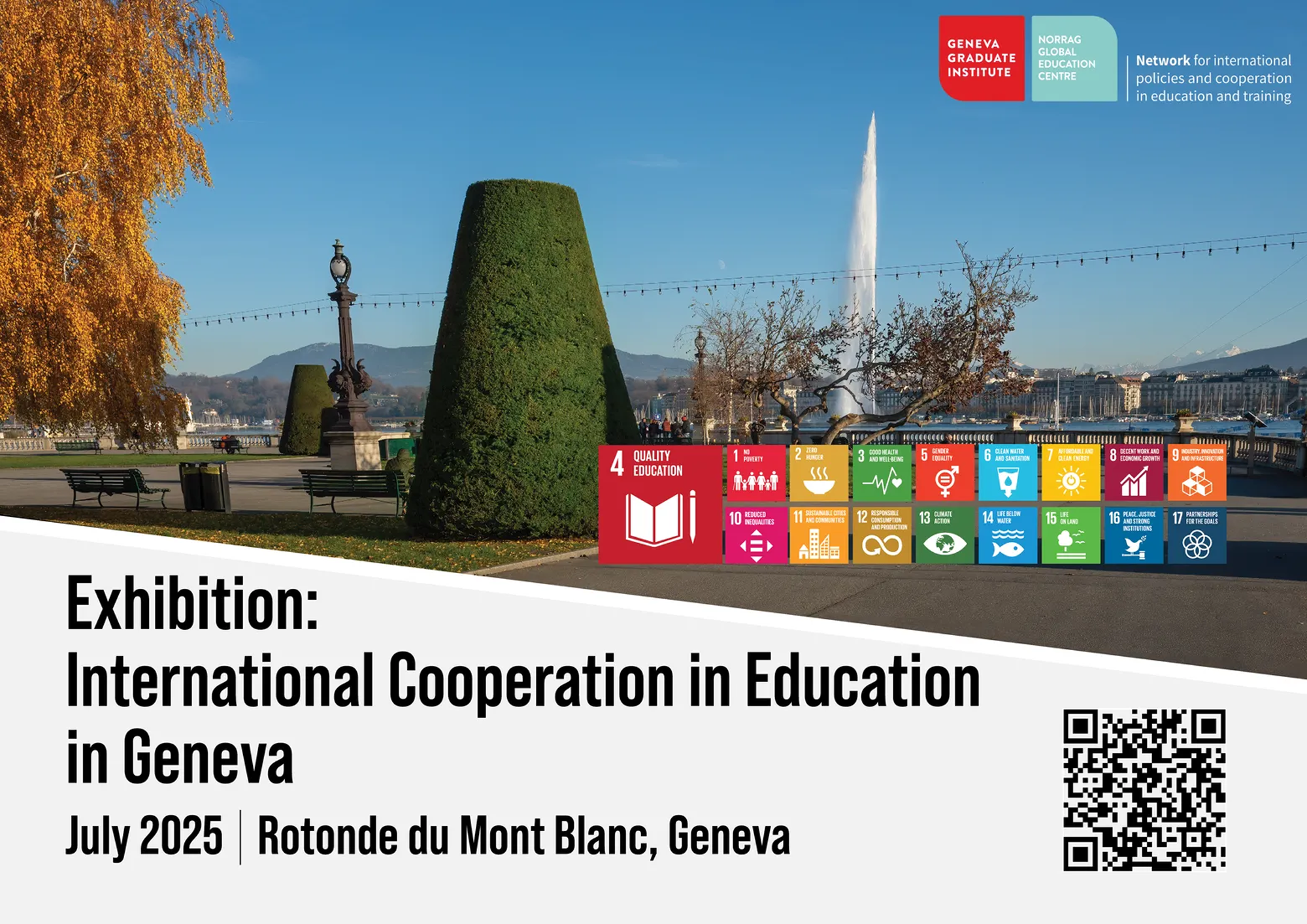Geneva is not only a global diplomatic hub—it’s a powerhouse for international cooperation in education and sustainable development. Home to 43 international organizations, 750 NGOs, and diplomatic missions from 184 countries to the UN Office in Geneva, International Geneva plays a pivotal role in achieving the Sustainable Development Goals (SDGs) and developing the next global sustainability agenda.
At the heart of this effort is SDG 4: Quality Education, a fundamental human right and a transformative lever for achieving all 17 Sustainable Development Goals. From eradicating poverty to advancing gender equality, from promoting climate literacy to supporting peaceful societies, education is the connective tissue of sustainable development.
To bring this message to life, NORRAG—a Geneva-based global centre and network hosted by the Geneva Graduate Institute—launched the International Geneva project to map the landscape of international education cooperation in Geneva, and its impact on a global scale. The results of this research will culminate in a public exhibition at the Rotonde du Mont-Blanc in July 2025, designed to make these global efforts available to the public.
Each panel in the exhibition draws links between education and another SDG—climate action, gender equality, poverty reduction, or peacebuilding—and spotlights the UN agencies and Geneva-based actors advancing this work, such as the Convention on International Trade in Endangered Species of Wild Fauna and Flora (CITES), Education Cannot Wait (ECW), the Geneva Global Hub for Education in Emergencies, the Geneva Water Hub, the UNICEF-ITU initiative GIGA, the Global WASH Cluster, the International Labour Organisation (ILO), the Inter-Agency Network for Education in Emergencies (INEE), the School Meals Coalition, the UNESCO International Bureau of Education (IBE), the United Nations Populations Funds (UNFPA), the World Climate Research Programme (WCRP), and more. Among those, the UN Research Institute for Social Development (UNRISD), whose interdisciplinary research underscores how social policies and inclusive education are essential to achieving equitable development outcomes and reducing inequalities.
The exhibition also highlights how NORRAG’s research has benefitted from meaningful collaboration with Geneva’s multilateral actors—turning academic insights into accessible, action-oriented knowledge products for the public. This commitment to accessible, multilingual, and visually engaging formats reflects a broader push across International Geneva to bring research beyond policy circles and into public consciousness.
Cooperation is critical—internationally and in Geneva—to harnessing the potential of education to achieve the SDGs. As NORRAG’s project shows:
● Education can promote climate literacy, and 91% of young people want more action-oriented climate change education. However, only about half of teachers worldwide reported receiving formal training on climate change and sustainable lifestyles.
● 75% of young people are concerned about the current state of the ocean, and education can help them understand how to promote sustainable ecosystems.
● Education has the potential to be a key driver of poverty alleviation and inclusion, but discrimination (driven by ability, ethnicity, gender, sex and socio-economic status) results in certain children and youth being excluded from education and training just because of who they are.
● The average rate of young people not in employment, education, or training (NEET) in low-income countries was almost 29%, compared to just over 10% in high-income countries.
● 388 million children in 161 countries receive school meals, mostly funded by national budgets, resulting in better health and learning outcomes.
● Education is emblematic of humanitarian-development-peace nexus approaches. 234 million children’s education is affected by conflict and crises in 2025, many of which have lasted many years or even decades.
As crises grow more complex, and the 2030 Agenda deadline draws closer, partnerships between research institutions like the Albert Hirschman Centre on Democracy, the Global Health Center, the Tech Hub, the Think Ahead on Societal Change platform, UNRISD, and others, are essential. Together, they are showing how Geneva’s research and policy ecosystem can innovate to make global knowledge accessible, relevant, and transformative—for learners of all ages, in every region.
Join us in July to witness these connections in action. Because education doesn’t just change minds—it changes the world.
Exhibition dates: 1–31 July 2025
Venue: Rotonde du Mont Blanc, Geneva, Switzerland
Who is NORRAG?
NORRAG is the Global Education Centre of the Geneva Graduate Institute and a global network for international policies and cooperation in education and training. The NORRAG network comprises 6,100 members from 182 countries, over half of whom are based in the Global South. NORRAG supports public, private and voluntary sectors and academia worldwide in our common goal to improve equitable and quality education and learning outcomes for the learners and societies that are at the centre of all education policy and practice. Our strength lies in addressing under-researched questions of quality and equity in key issues in education and development and in amplifying under-represented expertise. For more information, visit https://www.norrageducation.org/



